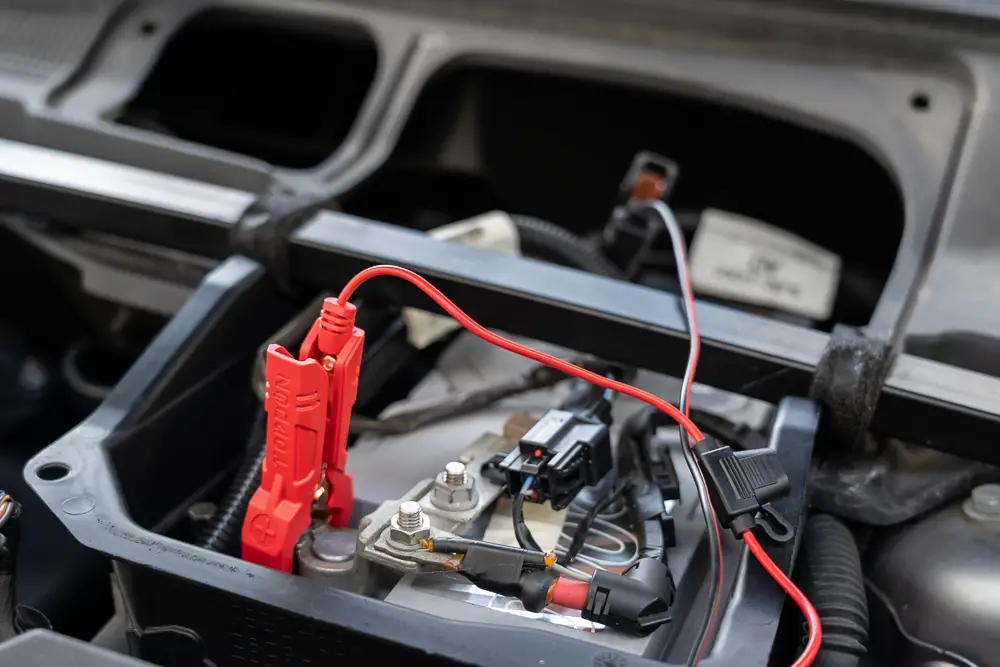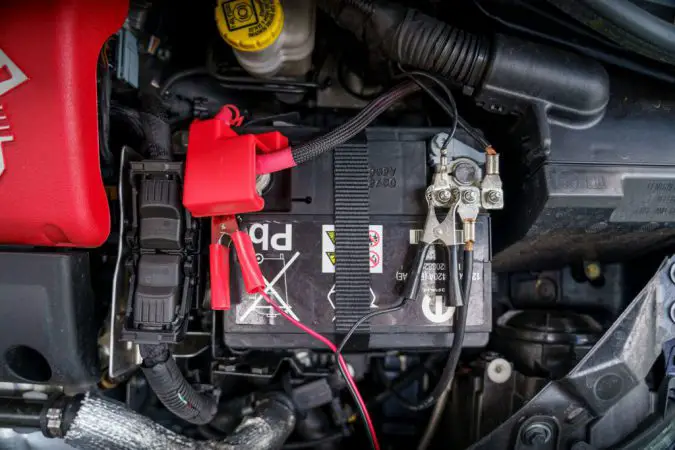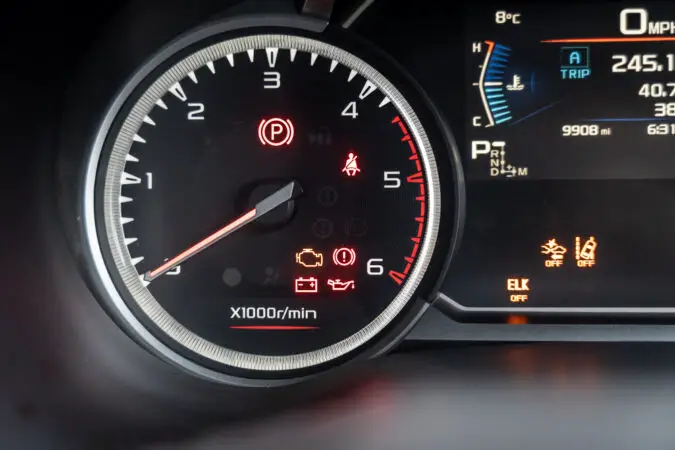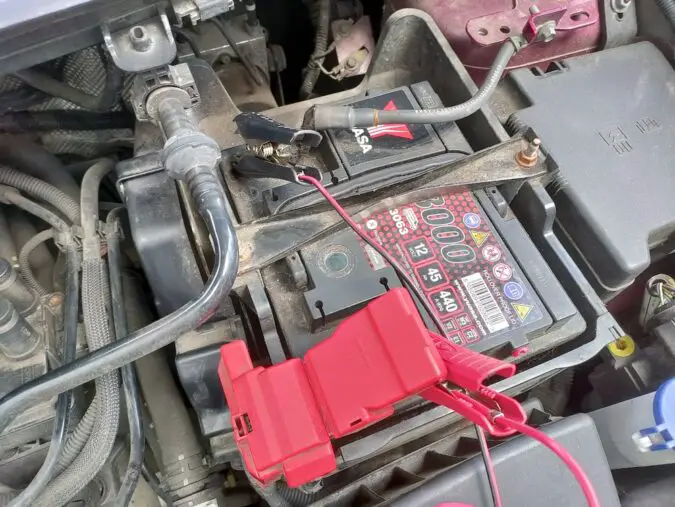Has your vehicle been struggling during startup? Are you worried that this is related to a weak battery? If so, you have come to the right place. In this article, we are going to take a look at a number of weak car battery symptoms. When you finish this article, you will have a good understanding of identifying a weak battery.
Having an issue with your car battery can be a stressful situation. The battery is one of the key components of a modern vehicle. Doubting whether it is functioning properly or not can have an impact on your mental health. If your vehicle is indeed having issues with the battery, it is important to get it fixed before it leads to greater mechanical issues.
That is the reason why you should be able to identify the symptoms of a weak car battery easily. It is important that you correctly understand the factors that cause this problem. You should also know how to prevent this from happening again in the future, and that is exactly the type of information we are looking to provide you here.
First, we will look at what the car battery is and what are its functions inside your vehicle. This will give you a clear idea of the importance of maintaining a healthy car battery.
What Are the Functions Of A Car Battery?
Before diving into a discussion about weak car battery symptoms, you should have a clear understanding of what the battery does in your car. So, if you are ready to learn the basics about car batteries, follow along.
The battery is an integral element in the starting system of a vehicle, and its main purpose is to provide the electrical power that is required for the starting of your vehicle. When you turn the ignition on, the battery is responsible for sending voltage to the starter motor.
The starter motor then turns some gears, which makes the engine start. The battery gets its electrical energy through a chemical process. A car battery consists of a number of lead plates that are submerged in a solution of sulfuric acid and water. This solution reacts with the active material on the lead plates as the ignition is triggered, which in turn generates an electrical current.
With that technical explanation out of the way, you may be looking forward to learning about weak car battery symptoms. Before that, it is important that we get to know the different types of car batteries available. This will be helpful for you when selecting your next battery.
Types Of Car Batteries
In this section, we will be discussing some of the most common varieties of car batteries. Each variety comes with its own set of weak car battery symptoms, so knowing your battery variety can be really helpful.
1. Flooded Lead Acid Battery
In our discussion about weak car battery symptoms, this is the first type of battery we are going to discuss. Also called “Wet Cells”, these are one of the most common types on the market. Wet cell batteries are made up of 6 cells and can supply a voltage of 12.6V when it has a full charge. Periodically topping off the electrolyte solution of the battery must be done as a maintenance procedure to ensure longevity.
2. Silver Calcium Battery
This variety of car batteries is more corrosion resistant than wet cells. The fact that these batteries are maintenance-free makes them a great choice for consumers. However, these come with the caveat of quick deterioration.
3. Enhanced Flooded Battery
This is another evolution of the wet cell battery. EFBs have a sealed design and are used in cars with simple start-stop technology. They are capable of over 50,000 more engine cranks when compared with wet cells.
4. Absorbent Glass Mat Battery
With a faster charge-up time and 3 times more cycle life, AGM batteries have made wet cells obsolete. Although these can cost more than twice the cost of a wet cell the advantages provided by them justify the price.
Now you know about some of the popular car battery types on the market. With that, we will shift our attention toward weak car battery symptoms.
Symptoms Of A Weak Car Battery
So far we have talked about the importance of the car battery as well as about some common battery varieties. Now it is time for us to discuss weak car battery symptoms. Here we will go through some of the most common weak car battery symptoms so that you will be able to identify them as soon as possible. Let’s get started!
Weak Car Battery Symptoms #1: Warning Light On The Dashboard
If you see a red battery symbol on your dashboard, it is an indication that you have a battery issue. This is one of the most common weak car battery symptoms. This light turns on when the car battery is not charging properly. It can also turn on when the battery is having an internal issue. Often, this warning can pop up due to alternator issues as well. If you are facing this issue, it can be a symptom of a weak battery and we recommend that you get it checked out by a professional.
Weak Car Battery Symptoms #2: Weak Headlights
The headlights of your vehicle can give an indication of whether you have a bad battery. Simply turn them on with the engine off, and if the glow is weaker you know you have a problem. This happens because when the engine is off the alternator is no longer used. So, the battery is in charge of the electrical components. A weak battery issue can start with the headlights and quickly spread to the other electrical components.
Weak Car Battery Symptoms #3: Slow Engine Cranks
Slow cranks are one of the most significant indications of a weak battery. This can worsen over time, eventually leading to your electronics also malfunctioning. We warn you about this because it can get you stranded and cost you time and money. Slow cranks happen when the battery cannot deliver enough energy to rotate the flywheel. This is one of the weak car battery symptoms that require immediate attention.
Weak Car Battery Symptoms #4: Corroded Battery Terminals
Another symptom of a weak car battery is corrosion on the battery terminals. Although this is not a direct indication, it can be a signal for a battery issue. A loose connection or low battery water levels may be the cause of corrosion. Cleaning the corrosion may be a temporary fix for this problem. However, if corrosion keeps building you may need a battery replacement.
Weak Car Battery Symptoms #5: Electrical Components Failure
The car battery is in charge of powering the various electrical components of the vehicle. Weak car battery symptoms may be indicated by failures in heated seats, power windows, power mirrors, and dome lights among others.
Weak Car Battery Symptoms #6: Performance Issues
The two main components responsible for the electronics of a vehicle are the battery and the alternator. A weak battery can limit the electrical output of the vehicle. This can be recognized as a safety hazard by the vehicle and cause performance issues.
Weak Car Battery Symptoms #7: Misshaped Casing
A swelled or warped casing is another one of the weak car battery symptoms we will be discussing here. This can happen due to age or due to weather conditions. Not taking proper care of the battery can also lead to battery swelling. If this happens to your battery there is no way to save it. The only option is to replace the battery.
These are some of the most common weak car battery symptoms. If you are encountering any of these it is high time for a battery replacement. However, there are some more indications of a weak car battery. You may be curious to learn about these facts as well. So, let us proceed with our discussion about weak car battery symptoms!
Sulfur Smell In Car
The smell of sulfur can also be interpreted as the smell of rotten eggs by some people (you can learn more in our overview of my car smells like rotten eggs). This is one of the most easily recognizable weak car battery symptoms. As we discussed earlier, car batteries contain an electrolyte solution. This solution is made up of a combination of water and sulfuric acid. With time the battery can start to wear and as a result, these elements may evaporate. This can result in changes in the composition of the mixture.
The end result will be the battery overheating. The sulfur smell is caused by the electrolyte solution boiling inside the battery. In severe instances, you may even be able to see the battery smoking. If you ever feel this sulfur smell in your vehicle, immediately replace the battery. We say that because an overheating battery can even lead to a fire and even the loss of lives.
Now that you have a clear idea about weak car battery symptoms, you may want to know what causes a car battery to die repeatedly. We think that you should be well informed about that. We say that because by knowing these facts, you will be able to prevent this from happening to you in the future.
Car Battery Keeps Dying
There are several issues that may cause a car battery to die repeatedly. Here we are going to discuss some of the more well-known causes of this issue.
1. A Faulty Alternator Can Lead To Weak Car Battery Symptoms
One of the main causes for a repeatedly dying battery can be a faulty alternator. The alternator is in charge of charging the battery once the engine is turned on. The alternator functions by converting the mechanical energy of the engine into electrical energy. This electrical energy is what is used to charge the battery.
The alternator can go bad due to several reasons. Jump starting the car in a wrong manner or liquids leaking into the alternator are some common causes. When this happens, it can affect the battery and cause weak car battery symptoms to arise.
2. Extreme Temperatures Can Cause Weak Car Battery Symptoms
Batteries are sensitive to the temperature of the environment. Excessive heat and cold weather can cause irreversible harm to the battery of your car. Higher temperatures can lead to evaporation of battery fluid, damaging the internals of the battery. It can also cause the deterioration of the lead plates which are inside the battery.
Higher temperatures can also cause overcharging of the car battery. This overcharging can occur due to the components of the battery charging system components. Overall, higher temperatures can shorten the battery life of your vehicle.
On the other hand, cold weather is not exactly healthy for your battery either. It can reduce the capacity of the battery and reduce the recharging rate of the battery. Furthermore, the load on your battery may increase in the wintertime. This is because features like heating, headlights, and defrosters are used more during the winter period. All these issues can weaken your battery and make it die repeatedly.
3. The Vehicle Hasn’t Been Driven In A Long Time
Like most things, batteries also lose their charge as time progresses. This can simply be due to the nature of car batteries, or it can be an issue called a parasitic drain. Parasitic drain refers to when your vehicle’s battery drain is higher than normal when the vehicle is parked. This can happen for a number of reasons. Mostly it is related to a faulty electronic accessory that doesn’t turn off as intended. This accessory may keep draining your battery as long as the vehicle is parked.
As we mentioned previously, the alternator is the other component that is responsible for providing electricity. You may want to know how to differentiate a weak battery from an alternator. That’s exactly what we are going to discuss in the next section.
Signs Of A Bad Car Battery Vs Alternator
Here we will give you tips on how to differentiate weak car battery symptoms from the symptoms of a bad alternator. You can use this information to identify the correct issue and get it fixed appropriately.
1. Frequent Stalls
One of the main indications of a bad alternator is the vehicle frequently stalling. This is mostly caused by the malfunctioning of the fuel injectors. A faulty alternator may not be able to provide the electricity needed for the fuel injectors to function. This can lead to the engine not getting fuel, causing stalls. If your vehicle is suffering from this issue, we recommend getting your alternator checked by a professional.
2. Whining Sounds from the Engine
The alternator works through a belt-driven mechanism. If this belt gets worn out or misaligned it can lead to alternator failures. If you hear a squeaking sound from the engine, it can be a sign of this issue. The bearings inside the alternator can also deteriorate over time. Worn bearings can be easily identified by the humming sound they produce.
If you have taken your vehicle to a mechanic and confirmed that there are no issues with the alternator, then the weak car battery symptoms you are facing may indicate that you are in need of a battery replacement. In that case, you may want to know the cost of a battery replacement. We will give you that information in the next section.
Car Battery Cost
Car battery prices mainly vary according to the technology of the battery as well as the expected lifespan of the battery. What does that mean? Well, you can find batteries in the market with 36-month, 48-month, or even 60-month expected lifespans. As you may have guessed, the higher the lifespan, the higher the cost of the battery. Other factors like the brand of the battery, weight, length of the warranty, performance as well as where you purchase the battery can have an effect on the car battery cost.
Purchase Cost
Typically, the cheapest type of batteries on the market are lead-acid batteries. These can cost you in the range of $70 – $180. If the old battery is not provided, a core charge may be added on top of the purchase price.
This core charge can vary between $5 -$15 according to your state, and it is a mandated charge by the government with the goal of promoting recycling. On the other hand, you can buy a good quality AGM battery for a price between $150 – $250. Although this cost may seem steep, it can pay off in long-term reliability. We recommend you go with an AGM battery if you are able to afford it.
Installation Cost
After you have made your purchase, you may have to pay an installation cost to get it installed in your vehicle as well. Most users will be able to easily replace the batteries by themselves by referring to an online guide.
However, if you are not ready to take on this challenge for whatever reason, you can get the battery installed in about 10 minutes by a mechanic. Some vendors may offer you a free installation once you have purchased a battery from them. However, some shops may quote you $10-$50 for a battery installation. We think that you are better off installing the battery by yourself.
Car Battery and Alternator: Signs of Failure and What to Do
- The battery provides power to crank the engine, while the alternator recharges the battery while the vehicle is running.
- A bad alternator can cause similar problems as a bad battery, but it is more expensive to repair.
- Signs of a bad battery include difficulty starting the car, dim/flickering headlights and taillights, and dim interior/dashboard lights.
- Accessories like an internal inverter can reduce the battery’s lifespan.
- Corrosion around the points on the battery may be a sign of degradation.
- A warning light indicator on the dashboard can indicate a failing battery.
- Signs of a bad alternator include the car dying after a jump start, a dropping voltage meter on the dashboard, and vibrations while driving.
- Checking the battery voltage after charging can indicate a bad alternator.
- A new battery can be purchased at an auto parts store or replaced by oneself, but an alternator may require professional repair or replacement.
- It’s important to have a mechanic inspect the vehicle if the battery or alternator fails since the signs may indicate other mechanical problems.
Conclusion To Weak Car Battery Symptoms
We have reached the end of our article about weak car battery symptoms. During the length of this article, we have discussed about a number of important topics on car batteries. We started by giving you an introduction to what car batteries are, as well as some of the main functions of the car battery in your vehicle.
Then we moved on to the different types of car batteries on the market while also talking about their various benefits and drawbacks. We looked into a number of the most common weak car battery symptoms, and also discussed why car batteries may keep dying. We taught you on how to differentiate between a faulty battery and a faulty alternator. Finally, we presented you with information on the replacement cost of a battery.
FAQs On Weak Car Battery Symptoms
Here are some popular FAQs:
How Much Is A New Car Battery
The cost of a car battery depends on factors like manufacturer, battery technology, warranty, and expected lifespan. Typically, a lead-acid battery can be had in the $70 to $180 price range. AGM batteries start at $150 and may run you as high as $250 for a top-of-the-line model.
How To Start A Car With A Dead Battery
To start a car with a dead battery, you can try jump starting. The easiest way to jump-start a car is through the use of a portable vehicle jump starter. If you don’t have such a device at hand, you can try jumpstarting the vehicle the old-fashioned way. For this, you need the help of a donor vehicle. Turn off the engines of both vehicles after they have been parked next to each other. Next, connect the jumper cables to both vehicles. Be careful to connect the cables to the positive and negative terminals in the correct way. Incorrect cable connections have the risk of destroying the electrical systems of both vehicles. After connecting the vehicles, turn on the vehicles. First, start the donor vehicle, then the one with the dead battery. Keep the engine running to give the alternator enough time to charge the battery.
Can A Car Battery Be Too Dead To Jump Start
In most situations, you can jump-start a fully discharged car battery. However, if the battery voltage has dropped below the 10.5V mark the battery has been permanently managed. In that case, you have no other options left other than replacing the battery.
Can A Weak Alternator Cause Poor Engine Performance
A weak alternator can have a number of negative effects on your vehicle. A weak alternator can limit the electricity supply to the fuel injectors of your vehicle. As the fuel injectors are an integral part of generating power in your engine, this can result in poor performance. A weak alternator can also lead your engine to misfire, idle roughly as well as accelerate poorly. On severe occasions a bad alternator can cause your engine to constantly stall, causing damage to its internals of it.
What Color Is Positive On A Car Battery
The positive terminal of a car battery can easily be identified by the “+” symbol marked on it. Some batteries may have the word “POS” marked on the positive terminal instead as well. On most occasions, the positive terminal of a car battery is associated with red color.




